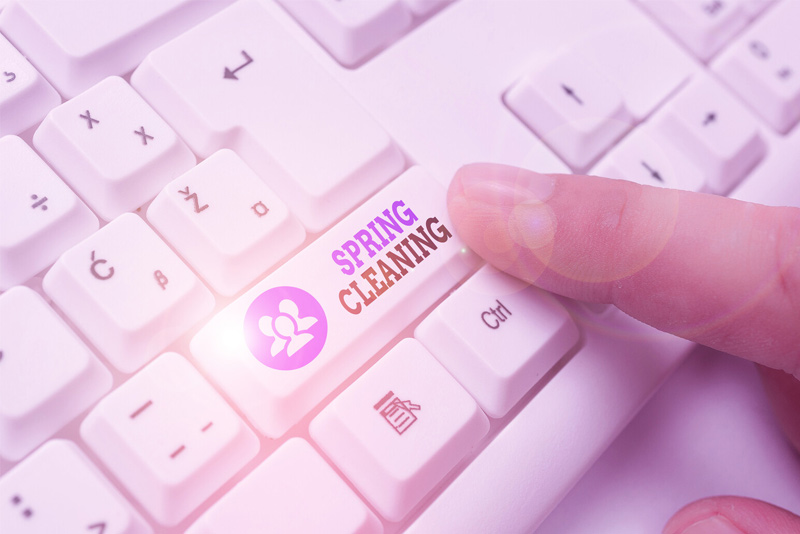Do you know that a clean office can increase productivity by at least five percent? Yes, it’s true! A clean office boosts productivity, enhances impressions and can be a real mood booster. As spring is rapidly approaching, it is the right time for office cleaning, which includes mopping floors, dusting furniture, and wiping windows, and importantly, proper records management. For most organizations, spring is an ideal time of year to start cleaning out those filing cabinets and shred old documents. Many also partner with professional data cleansing companies to spring clean their data.
While spring cleaning your documents, first sort significant documents that you need to keep from ones you no longer need. Once you have sorted your documents, lock up the ones you decide to keep or scan them, store your digital files in a secure place and then shred the physical documents that you no longer need. As a data breach can put your organization at risk as well as tarnish your reputation, it is very important to consider shredding physical documents. Proper document shredding ensures that the documents that you no longer need are destroyed. This process helps to comply with the law to:
- Protect the environment
- Prevent identity theft
- Get rid of clutter and prevent fire hazards
According to Security, most data breaches such as identity theft and fraud involves paper records or information. This scenario can be avoided with document shredding, as it is the number one way to protect hard-copy information. More than being important for security and cybersecurity reasons, document shredding is also the law, as several state and federal laws mandate that you safeguard all private information regarding your employees and customers. To remain compliant with these particular laws, it’s important to destroy all confidential and outdated business information properly by securely shredding any document that no longer requires storage.
Here are some tips for secure document shredding:
- Be Prepared and Analyze your Needs: Before shredding documents, you have to evaluate and assemble a checklist of which documents you need to keep, and which do you need to shred.
- Security Must be your Top Priority: While spring cleaning, always keep in mind that security is your priority – be it your business or personal documents. Both types of documents might contain valuable and sensitive information – such as your Social Security Number, credit card numbers, bank account details, information about your company or clients – which has to be handled very carefully.
- Shred Strategically: Once you have sorted out outdated confidential or valuable documents such as bills, invoices, signed receipts, and financial plans, shred it. Establish company-wide rules on shredding and disposal because the process protects sensitive data.
- Consider Shredding Old Taxes: Once you have finished filing your taxes for the year, look through any old financial records and determine what you don’t need. According to the Internal Revenue Service (IRS), most tax records can be shredded after three years.
- Plan Ahead: As many organizations do their record maintenance during spring cleaning, it’s essential to plan ahead and make sure you have the assistance and resources you need to stick to your record maintenance and document shredding schedule.
- Pick the Right Shredder: Make sure to pick the correct shredding equipment throughout your office to ensure security procedures are being followed. You have to pick the right shredder, as it come with different cut sizes and styles, and these variables directly impact how secure your shredded documents will be. Generally, look for confetti, diamond, or micro cut shredders as they obliterate highly sensitive information.
- Shred on Schedule: However, apart from spring cleaning, you can also shred your outdated documents whenever you can- daily, weekly, or monthly basis. Depending on your volume and holding capacity, regular shredding helps to prevent a heavy buildup of documents.
- Plan for the Unexpected: Create a proper disaster recovery plan for the unexpected. This will ensure that:a. Your important and confidential documents are properly scanned and imaged. For this you can rely on a reliable document scanning company that can handle huge volumes of fragile documents without causing any damage to the originals.
b. You have digital access to the documents you need 24/7. - Follow the Rules Diligently: Depending on your niche and regulatory environment, specific rules about recordkeeping and document shredding may apply. Make sure you’re familiar with the laws you must follow and study the role of digital storage, and make provisions if your paper documents require shredding.
These above-mentioned tips can help you handle document shredding securely, properly and with minimal stress. Choosing an experienced document scanning company is the first step towards your spring cleaning as they will help in bulk scanning of the documents that you need to keep.




